- Home
- Donald Hamilton
The Devastators Page 6
The Devastators Read online
Page 6
“I’m afraid not,” I said. “All I know is that my wife is missing.”
“To be sure.” His voice was cool. “Well, where and when will you want the car?”
I told him. Afterwards, I replaced the phone, got up and made a face at my image in the dresser mirror. I don’t really like asking help from people I have to lie to, or lying to people I have to ask for help. I got my suitcase, threw it on the bed and did some tricks to open a camouflaged compartment holding, among other ingenious toys, my little .38 Special revolver: the snub-nosed, five-shot, aluminum-framed model that, too light to absorb much of the recoil of its heavy cartridge, will damn near tear your hand off when you fire it, not to mention blasting holes in both eardrums.
It is, in my opinion, just about as logical a weapon for a man in a supposedly hush-hush job as a 20mm antitank gun, but it’s what the efficiency experts in Washington have decided we need. Regulations state that we must keep the miniature cannon handy at all times, cover permitting, but no experienced operative takes that rule seriously. I’ll carry it in my suitcase because I have to, but I’m damned if I’ll wear it unnecessarily. Nothing can get you into more trouble, particularly in a foreign country, than a firearm. Winnie, of course, had orders to carry no weapons whatever on this assignment, in line with her innocent act. When the time came for her to do her stuff, I was supposed to supply whatever she needed out of my private stock.
I closed the secret compartment, tucked the wicked little gun under my waistband, buttoned my coat and topcoat over it, and put my hat back on. There was one more item I required, and it was one that wasn’t supplied in the standard agent’s travel kit. I didn’t have anything suitable in my belongings. My only belt was needed to keep my pants up. I might even need it for other purposes, sooner or later, since it’s a rather special belt.
Luck came to my rescue—if it was luck. Maybe I’d found a clue after all. In hastily cleaning out the dresser, packing under duress, Winnie had apparently overlooked one small drawer. It contained some gloves, some nylons still in the plastic factory package, some odds and ends of cosmetics and costume jewelry, and a couple of belts. I chose a wide, black, soft-leather number with a big, tricky, dramatic buckle. Flashy though it was, it looked as if it might possibly be strong enough for what I had in mind. I coiled it up and dropped it into my pocket and went downstairs.
Claridge’s lounge bore no resemblance to the kind of dark, cramped chrome-plated cocktail-trap you’d find in, say, a New York hotel. It was a high-ceilinged, light, rambling, luxurious, pillared room that could have been the anteroom of a castle or palace where high-class people awaited audience with royalty. Silent waiters glided about with drinks procured from some unknown source. Nothing so vulgar as a bar was in evidence.
Vadya, still sitting at the same table near the door, was doing her part to maintain the tone of the place. She looked very high-class indeed. I walked up and seated myself facing her after tossing my hat and coat on an empty chair. I ordered a martini from the waiter who materialized at my side.
Vadya showed no surprise at seeing me. “Better make it a double, darling,” she said lazily. “They serve them in thimbles around here.”
“Make it a double,” I said.
“And get me another, please.”
“And another for the lady,” I said.
The waiter bowed and vanished. I leaned back and regarded Vadya with critical interest. After all, aside from our momentary encounter in the hotel doorway, it had been a couple of years since I’d seen her last.
She was putting on quite a show. Her hairdo was big but elaborately simple, if the words aren’t incompatible. The thrown-back mink stole was the real stuff. Her suit was tan wool—beige is the technical term, I believe—with a straight, short, close-fitting skirt, and a straight, short, loose-fitting jacket. I wondered idly what had happened to the old-fashioned notion of cutting jackets to fit the female human form. I’d thought it was kind of a nice idea, but then, fashion-wise, I’m obviously way behind the times.
There was a high-collared blouse of the kind of silk associated with caterpillars and mulberry trees instead of chemical vats. Her nylons were so sheer as to be almost nonexistent, just a nebulous hint of stocking, and her pumps had heels a yard long and an eighth of an inch in diameter. Well, almost. She looked sleek and well-fed and expensive.
The last time I’d seen her, on the other side of the Atlantic, she’d been playing a younger, leaner, and cheaper role. I could remember her dressed in grubby white shorts, as short and tight as the law allowed, and a limp boy’s shirt with a missing button. I could also recall her dressed in even less. It had been quite an intriguing assignment, the one that had brought us together out there in the great Southwest.
Fortunately, our national interests had run more or less parallel—it happens occasionally—but we’d played a fast game of trickery and double-cross before this became apparent. I’d put her on a plane afterwards and shipped her out of the country instead of wringing her neck on general principles, as I undoubtedly should have. Winnie, the hard-boiled little kook, would have called that sentimentality, I suppose. Softhearted Helm, the Galahad of the undercover services. Well, hell, you can’t kill everybody.
I said, “If that’s all you, doll, you’ve been eating too much. I don’t like my women pudgy.”
“Your women!” she murmured.
I grinned. “Well, I seem to recall staking a claim of sorts, the way it’s usually done. In a motel in Tucson, if I remember correctly.”
“But now you have a pretty little blonde wife, I am told. And you are celebrating your honeymoon.” She was watching me closely. She waited a little, perhaps giving me a chance to go into my bereaved-husband act, but I knew her well enough to know that my only chance of making her believe I was really married was not to work at it at all. I had to play it cool and straight. Waving my arms and tearing my hair would get me nowhere; she’d know at once I was faking. When I didn’t react, she sighed theatrically. “Ah, to forget me so soon, for another woman, darling! I am hurt.”
The waiter was putting our drinks on the table. When he had gone, I said, “The only way you’ll ever be hurt, Vadya, is with an axe. What are you doing here, anyway?”
“Isn’t it obvious? I heard you were here, so I came flying to see you.”
“Sure,” I said. “I am flattered.”
She let her playful smile fade, and said, “Strangely enough, I am telling you the truth, Matthew.”
I let that pass. “How am I supposed to introduce you, if anyone should ask?”
She said, in an accented voice, “Ah, you may call me Madame Dumaire, chéri. Madame Evelyn Dumaire. Monsieur Dumaire, unfortunately, is no longer among the living, but fortunately he left his widow well provided for.”
“I can see that,” I said, with a glance at the expensive furs. “Okay, Evelyn. And God help the French. I hope they have the ‘Mona Lisa’ nailed down tight or it will be in Moscow by morning.”
She shook her head. “No. It wasn’t the ‘Mona Lisa,’ of course—who would waste a good agent’s time on that smirking canvas female?—and I have been taken off the Paris assignment, anyway. They called me at lunch. They said, ‘There is a man in London with whom you are acquainted, Vadya. He spared your life once, the record shows. This would seem to indicate that you are the best person we have to negotiate with him. There is no time to construct a new cover. You will go over there—immediately, by jet airplane—as plump Madame Dumaire.’” She smiled. “You see, I am being devastatingly frank. I am letting you know from the start that I was sent here because you were here. Because my employers think I am conscienceless enough to try to capitalize on our old friendship. As of course I am.”
It wasn’t exactly what I’d expected. To give myself time to think about it, I said, “Some friendship! I’ve still got the scars where you and your partner played tic-tac-toe on my chest with a hot soldering iron.”
She said, quite undisturbed, “It was a
misunderstanding. Poor Max.”
“Poor Max, hell,” I said. “After that little branding session, what made him think I wouldn’t shoot when he tried to pull a gun on me next day? Well, I guess you could call that a misunderstanding, too.” I grimaced. “Are you serious? Do you really expect me to believe you were sent here officially to renew our old acquaintance?”
She said, “Don’t be so clever and suspicious, my friend. Remember that sometimes the direct approach is the best. Anyway, it is the one I have been instructed to use. You see, we know why you are here in England.”
I said, poker-faced, “And why am I here?”
“You are here because there is a crazy man at large, an American scientist named McRow. This man is working on a fantastic biological weapon with which he apparently intends to blackmail the world, my country included. At least that is the intelligence we have received. Well, there are many crazy men with big ideas about getting rich, and this one would not worry us, were it not for the fact that he has acquired strong backing somewhere. McRow’s motives seem to be simple and financial, but we are not sure of the motives of his backers. They could be military, and there are certain countries eastward that, while they boast of their ancient civilizations, are not, we feel, advanced enough politically to be trusted with a weapon such as this.”
“You mean they don’t have quite the right Communist slant on things?”
“Don’t be sarcastic, Matthew. They don’t have quite the right democratic slant on things, either. There is also a certain racial factor. I do not believe many would weep, out there in the East, if all white men were to get very sick and die. There are even some irresponsible leaders out there, we feel, who would willingly sacrifice large parts of their own populations to achieve this purpose—as long as a loyal elite was assured of survival. That could be achieved by a serum or vaccine; and we think that is what McRow is now working to perfect, since he has already shown that he can produce super-virulent forms of several common diseases. He will presumably select the one for which he can most easily produce an effective antidote.” She drew a long breath. “You see, I am being absolutely frank; I am describing the problem to you exactly as it was described to me. Naturally, we would like this development for our own, but although they have tried hard, our people have failed to get it. So have yours.”
“What makes you think so?”
“The fact that you are here makes us think so, for one thing,” said Vadya. She laughed softly. “We are specialists, darling, you and I. We are not called upon to capture men alive, or bring home their nasty little secrets. When we are summoned everyone knows what it means. It means that all other methods have failed, and time is getting short, and there is only one thing left to do.” She looked at me earnestly across the table. “I am instructed to cooperate with you in any reasonable way, Matthew, until this international threat is removed. Until this man is killed and his laboratory destroyed.”
There was a little silence. Presently I said in a tentative way, “You know, the funny thing is, I really am on my honeymoon.” She didn’t say anything to this, and after a moment I went on: “Of course, that doesn’t mean I’m out of the business entirely.”
She smiled faintly. “I thought not.”
“I’ll have to know a little more before I get in touch with Washington. Suppose we have dinner together and you tell me exactly what you have in mind.”
“Yes, of course. Do you want to eat here?”
I threw a look toward the impressively formal dining room opening off the lounge, and said, “These Claridge waiters give a poor country boy from New Mexico a raging inferiority complex. I seem to remember a little place off Piccadilly Circus where we can relax and talk.”
“Whatever you say.”
She drew her furs around her, and waited for me to rise and attend to her chair like a gentleman. Then she pulled on her gloves, picked up her purse, and smiled at me over her shoulder to indicate that she was ready.
We walked out of the lounge together, and through the lobby to the street. Les was right on the ball. The doorman didn’t even have time to offer his services before the gleaming silvery sedan was gliding to the curb in front of the hotel. Vadya stopped and glanced at me with sudden suspicion.
“So I’ve got friends in London,” I said. “Hop in.”
She frowned at the chauffeur-driven Rolls, and looked back at me. “It is not that I do not trust you, darling, but I think I would prefer a taxicab.”
“Sure,” I said, close behind her. “But get in anyway. If I have to shoot from this angle, we’ll get blood and guts all over that lovely vehicle, and that would be a pity, wouldn’t it?”
8
Riding away from there, nobody spoke for a little. Vadya shifted position beside me, and reached up as if to rearrange her furs. I brought the snub-nosed revolver out where she could see it.
“Hands off the pelts,” I said. “I once knew a girl—a colleague of yours, as a matter of fact—who had a real tricky fur that looked just like that. She’s dead now, poor kid.”
Vadya let her gloved hands sink back into her lap. “You’re making a mistake, Matthew,” she said quietly.
She might well be right; but I couldn’t afford to show any doubts. “It happens to us all,” I said. “You make one, I make one. You wouldn’t want me to be perfect and show you up.”
“I don’t know what you mean—”
Our aristocratic chauffeur spoke without turning his head. “There’s a Mini following us, sir.”
It took me a moment to remember that this was the British way of referring affectionately to those boxy little Morrises and Austins—they’re identical except for the nameplate—that have the engine mounted crosswise to operate a tricky frontwheel drive, and tires borrowed from a small motorscooter. I didn’t look back. Instead I looked at Vadya. Her face was expressionless. Well, it would be.
I said, “That’s okay, driver. Let’s keep him on ice. The more the merrier. If I don’t get the information I want out of the woman, I’ll just work on down the line. You can keep him from interfering, can’t you?”
“Yes, sir.”
Vadya stirred uneasily beside me. “Matthew—”
I said, “Not now. You’ll get your chance to talk, later.”
We finished the drive without further conversation. The car stopped in a rather shabby, dark street of row houses several stories high. I had no real idea where we were. London is a big city and few foreigners learn it all. Les came around to open the door. I backed out cautiously, keeping Vadya covered as she emerged in her turn.
“It is the first door on the right on the first floor, sir,” Les said. “Ah, I believe you Americans call that the second floor, sir. One flight up, sir.”
“Very good.”
“I will be waiting, sir. There will be no interference.”
“Thanks. Come on, Mrs. Dumaire.”
Vadya started to speak and thought better of it. She started to yank her furs straight, but saw my gun steady, and thought better of that, too. She turned sharply and marched into the house ahead of me. The downstairs doors were unlocked. There was dim but adequate light in the dusty stairway, which looked somewhat like another London stairway I had reason to remember. The woman ahead of me turned right at the top, and stopped at the proper door.
“Open it,” I said.
Unlike most hall doors, it opened outward. It had to, since there was another door right behind it, opening the other way. I saw Vadya take stock of this soundproof arrangement. She glanced at me, shrugged, pushed the second door open, and went into the room beyond. I followed her, closing both doors behind us, locking the inner one, and pocketing the key.
Aside from the double door, it seemed like a room that matched the run-down neighborhood. It had a threadbare rug, a battered dresser, a tired old bed, and a single heavy armchair that seemed in better repair than the rest of the furnishings. There was an enameled tin basin, and a water pitcher, on the dresser. The cracked handl
e of a china thunder mug peeked out from under the bed. The illumination came from an ancient fixture suspended from the ceiling that had once burned gas. It gave surprisingly good light considering its apparent age.
Vadya had turned to face me. Her glamorous hairdo and glossy furs looked completely out of place in the dismal room. I felt a momentary qualm, but what the hell, she wasn’t really the pretty, plump, fashionable Madame Dumaire. She was just a cheap hired actress masquerading in a fancy-dress outfit paid for, no doubt, with state funds.
She said, “Matthew, really, I—”
The nice white kid gloves were a handicap, from her point of view. They not only made her fingers a little less nimble than they might have been, they made it very easy for me to see what her hands were doing. When one disappeared inside the furs, I socked her hard, right in the middle of her expensive suit. She doubled up, gasping. I clipped her judiciously across the neck and she fell to the floor. I mean, you can ask questions all night and get nowhere and prove nothing. If you’re going the interrogation route anyway, you might as well save everybody a lot of time by showing right at the start that you don’t mind bruising your knuckles.
I picked up the purse she had dropped, and yanked her furs free. She was already beginning to stir. Waiting for her to recover, I looked the stuff over. There was nothing in the purse beyond the usual feminine accessories and some official items confirming her identity as the widowed, wealthy Madame Evelyn Dumaire, citizeness of France. I tossed it on the bed.
The furs, as I’d expected, proved more rewarding. A cunningly hidden pocket at one end yielded up a tiny automatic pistol. Another secret fold in the satin lining produced a slim little plastic case. Inside was an interesting assortment of pills and powders and the means with which to administer them. It was the other side’s counterpart of our special drug kit, a sample of which reposed in my suitcase at the hotel.
I remembered that, down in Mexico, Vadya had been a fast girl with a Mickey. At that time she’d happened to be working to our mutual advantage, but it was something to keep in mind. I tossed the things on the bed, and went over and nudged her with my toe.

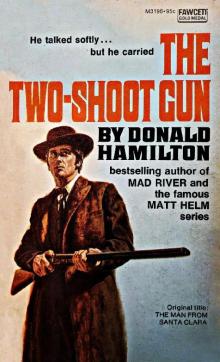 The Two-Shoot Gun
The Two-Shoot Gun Mad River
Mad River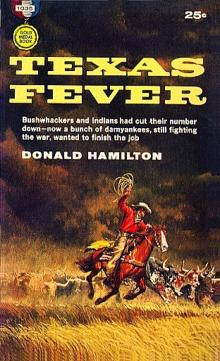 Texas Fever
Texas Fever Ambush at Blanco Canyon
Ambush at Blanco Canyon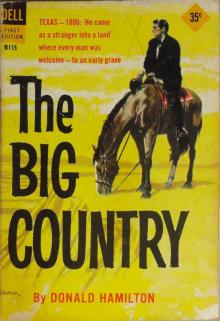 The Big Country
The Big Country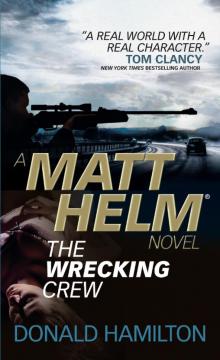 The Wrecking Crew
The Wrecking Crew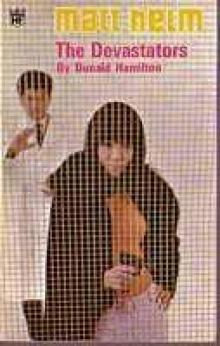 The Devastators mh-9
The Devastators mh-9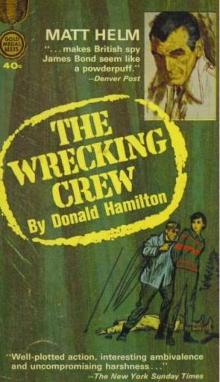 The Wrecking Crew mh-2
The Wrecking Crew mh-2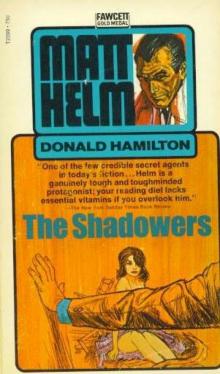 The Shadowers mh-7
The Shadowers mh-7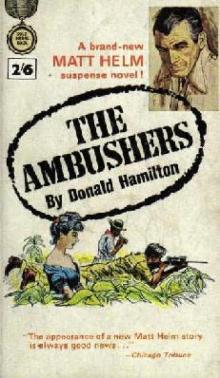 The Ambushers mh-6
The Ambushers mh-6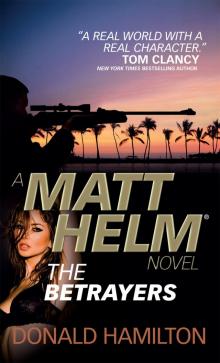 The Betrayers
The Betrayers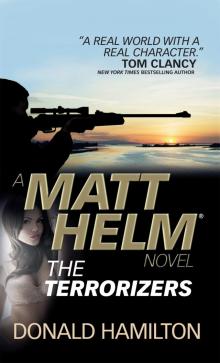 The Terrorizers
The Terrorizers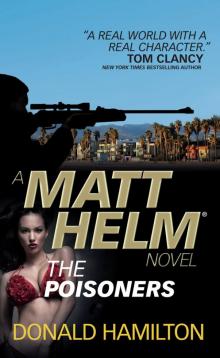 The Poisoners
The Poisoners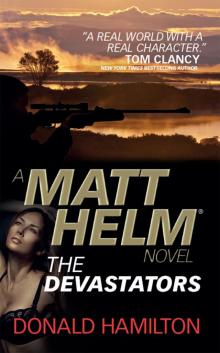 The Devastators
The Devastators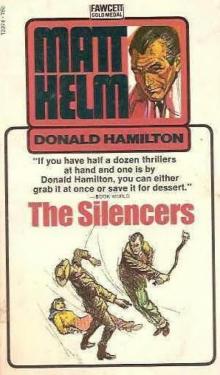 The Silencers mh-5
The Silencers mh-5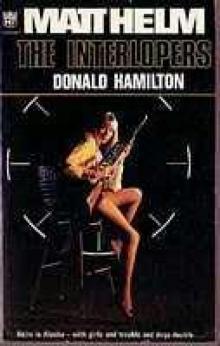 The Interlopers mh-12
The Interlopers mh-12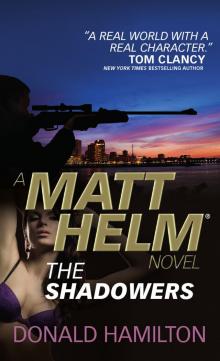 The Shadowers
The Shadowers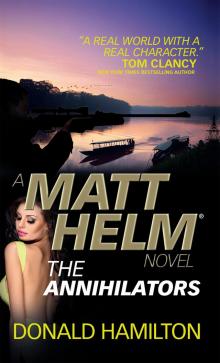 The Annihilators
The Annihilators The Vanishers
The Vanishers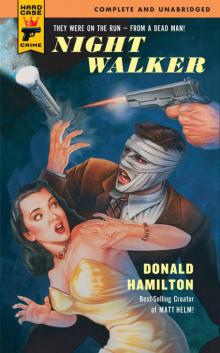 Night Walker
Night Walker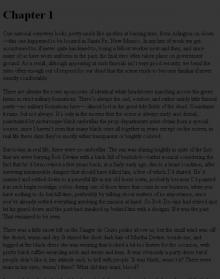 The Revengers
The Revengers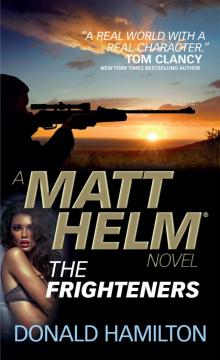 The Frighteners
The Frighteners The Infiltrators
The Infiltrators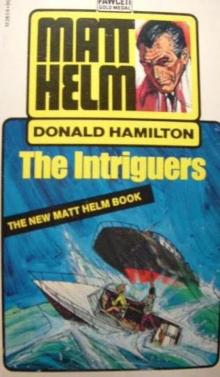 The Intriguers mh-14
The Intriguers mh-14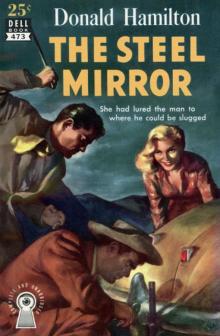 The Steel Mirror
The Steel Mirror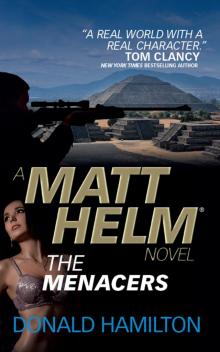 The Menacers
The Menacers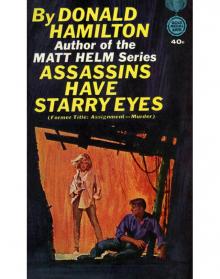 Assassins Have Starry Eyes
Assassins Have Starry Eyes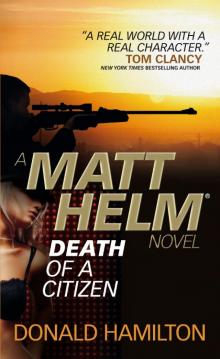 Death of a Citizen
Death of a Citizen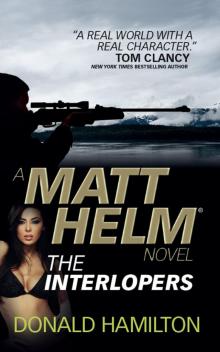 Matt Helm--The Interlopers
Matt Helm--The Interlopers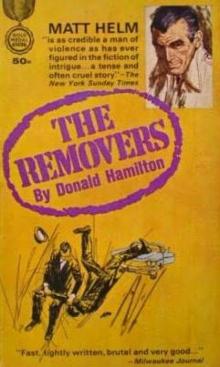 The Removers mh-3
The Removers mh-3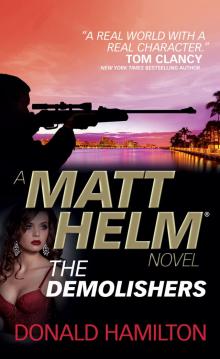 The Demolishers
The Demolishers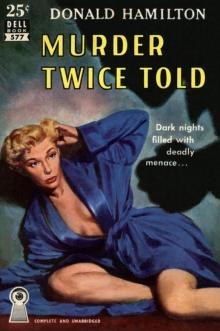 Murder Twice Told
Murder Twice Told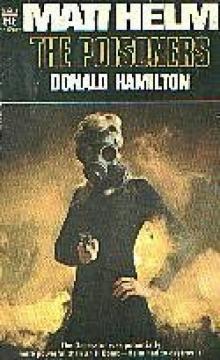 The Poisoners mh-13
The Poisoners mh-13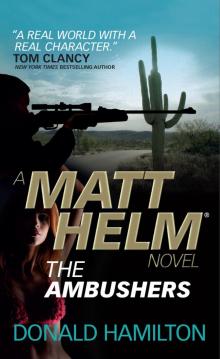 The Ambushers
The Ambushers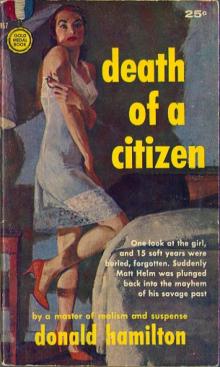 Death of a Citizen mh-1
Death of a Citizen mh-1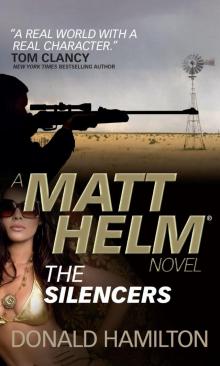 The Silencers
The Silencers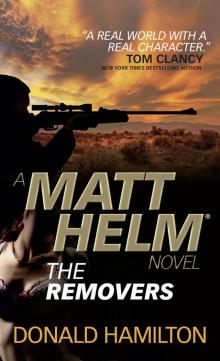 The Removers
The Removers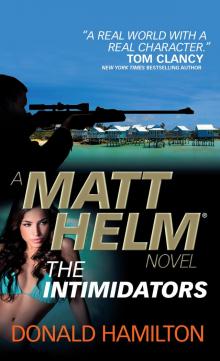 The Intimidators
The Intimidators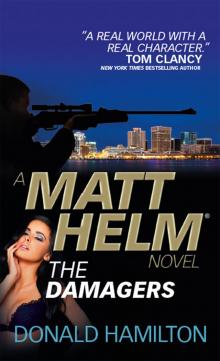 The Damagers
The Damagers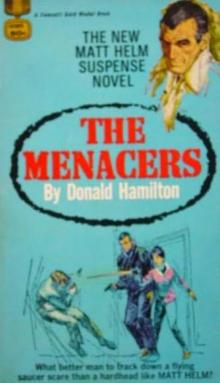 The Menacers mh-11
The Menacers mh-11 The Retaliators
The Retaliators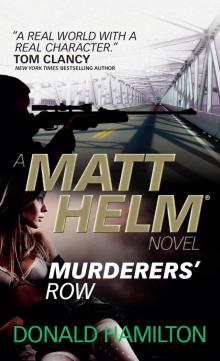 Murderers' Row
Murderers' Row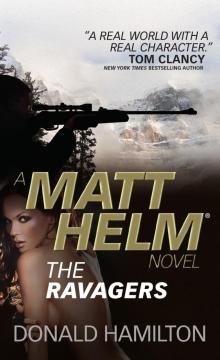 The Ravagers
The Ravagers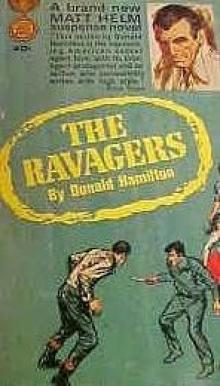 The Ravagers mh-8
The Ravagers mh-8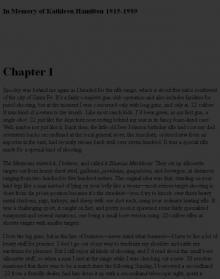 The Threateners
The Threateners The Betrayers mh-10
The Betrayers mh-10